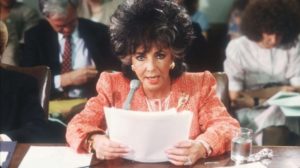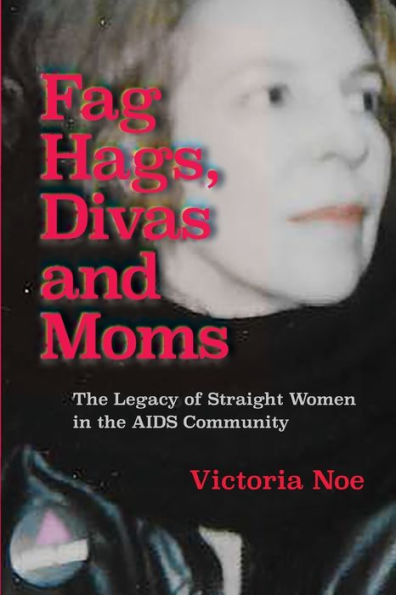Passing on the Lessons of the AIDS Epidemic
Apr 17, 2020 by Victoria Noe, in AIDS
, COVID-19
, Divas and Moms
, Elizabeth Taylor
, Fag Hags
, Grief
, women and AIDS
, women's history
[caption id="attachment_2340" align="alignleft" width="300"] Elizabeth Taylor, testifying before Congress[/caption]
Elizabeth Taylor, testifying before Congress[/caption]
When I was writing Fag Hags, Divas and Moms: The Legacy of Straight Women in the AIDS Community, I sometimes heard the voices of the women whose stories I was sharing. It was more of a feeling that they were in the room, reading over my shoulder. I’d had something very specific in mind when I began, but that idea changed, in large part because these women guided me. They made it a much better book.
Many of the women are no longer alive, so they don’t have to face another worldwide pandemic. But I realized that they and the ones still with us have a lot to say.
Dr. Molly Cooke, on facing down fears:
“I was quite visibly pregnant, and I was walking into the (intensive care unit to visit an AIDS patient) when one of the residents, a male resident, said, “Are you really sure you want to go in that room?” And I said, “What do you mean?” I had to stop and think before I understood what he was saying, and then I said, “Of course I do.”
Rita Moreno on compassion:
“The press showed up and exclaimed, ‘Why are you doing this?’ The implication being that this could be bad publicity. I answered. ‘Why wouldn’t I?’
Nora Burns on grief:
“I’ve thought long and hard how I could transform this aching sadness and longing for my friend David into a tribute to him, to our friendship, to our past. Then I recalled a note he once wrote me: it ended with ‘We have great subject matter for a best seller, shall we make it a collaboration?’ I suddenly knew how to honor David’s memory: By recounting the wild saga of two kids caught up in the sexy swirl of a never-ending party. The world has changed. So have I. But David remains the same in my memory. It’s that David I memorialize.”
Jennifer Miller on love:
“Underneath my anguish and pain from watching my brother’s health deteriorate, dealing with my anxiety over his precarious health, and watching him struggle to fulfill his dreams and goals...Tad wants to feel he’s making a difference, an impact. I want him to know that in my life, he has.”
Ruth Brinker on getting involved:
“I didn’t think I was doing anything special. I did what anyone would have done under those circumstances.”
Elizabeth Taylor, on taking action:
“I ask here and now for the national leadership that is necessary to fully appropriate this bill because I will continue to come and ask for it again and again and again until this is done, and I will not be silenced, and I will not give up and I will not be ignored.”
Dr. Michael Gottlieb on why Elizabeth Taylor was the right woman at the right time to fill a leadership vacuum:
“Someone in a leadership position - a president or first lady - could have told the country: Do the right thing. And the country would have listened. But no one in power rose to the moral occasion...Elizabeth was perfect for the role. And I think she knew that.”
These quotes are from a few of the women in my book, but they’re typical of thousands of others who have spent decades in the HIV/AIDS community. Women who are now making a difference in the COVID-19 community: volunteering, researching, at times risking their lives to work on the front lines.
They’re out there right now, channeling the passion that has made a difference in the HIV/AIDS community for almost forty years. They feel the unsettling familiarity of facing an unknown enemy. And like me, all those years ago, they don’t want to look back and know they did nothing.
Look for them. They’re out there: identifying needs, getting the work done and not giving a damn about excuses.
Listen to them. They speak with the authority of women who changed the course of HIV/AIDS and are ready to do it again for COVID-19.
This is life and death - again.
 Elizabeth Taylor, testifying before Congress[/caption]
Elizabeth Taylor, testifying before Congress[/caption]When I was writing Fag Hags, Divas and Moms: The Legacy of Straight Women in the AIDS Community, I sometimes heard the voices of the women whose stories I was sharing. It was more of a feeling that they were in the room, reading over my shoulder. I’d had something very specific in mind when I began, but that idea changed, in large part because these women guided me. They made it a much better book.
Many of the women are no longer alive, so they don’t have to face another worldwide pandemic. But I realized that they and the ones still with us have a lot to say.
Dr. Molly Cooke, on facing down fears:
“I was quite visibly pregnant, and I was walking into the (intensive care unit to visit an AIDS patient) when one of the residents, a male resident, said, “Are you really sure you want to go in that room?” And I said, “What do you mean?” I had to stop and think before I understood what he was saying, and then I said, “Of course I do.”
Rita Moreno on compassion:
“The press showed up and exclaimed, ‘Why are you doing this?’ The implication being that this could be bad publicity. I answered. ‘Why wouldn’t I?’
Nora Burns on grief:
“I’ve thought long and hard how I could transform this aching sadness and longing for my friend David into a tribute to him, to our friendship, to our past. Then I recalled a note he once wrote me: it ended with ‘We have great subject matter for a best seller, shall we make it a collaboration?’ I suddenly knew how to honor David’s memory: By recounting the wild saga of two kids caught up in the sexy swirl of a never-ending party. The world has changed. So have I. But David remains the same in my memory. It’s that David I memorialize.”
Jennifer Miller on love:
“Underneath my anguish and pain from watching my brother’s health deteriorate, dealing with my anxiety over his precarious health, and watching him struggle to fulfill his dreams and goals...Tad wants to feel he’s making a difference, an impact. I want him to know that in my life, he has.”
Ruth Brinker on getting involved:
“I didn’t think I was doing anything special. I did what anyone would have done under those circumstances.”
Elizabeth Taylor, on taking action:
“I ask here and now for the national leadership that is necessary to fully appropriate this bill because I will continue to come and ask for it again and again and again until this is done, and I will not be silenced, and I will not give up and I will not be ignored.”
Dr. Michael Gottlieb on why Elizabeth Taylor was the right woman at the right time to fill a leadership vacuum:
“Someone in a leadership position - a president or first lady - could have told the country: Do the right thing. And the country would have listened. But no one in power rose to the moral occasion...Elizabeth was perfect for the role. And I think she knew that.”
These quotes are from a few of the women in my book, but they’re typical of thousands of others who have spent decades in the HIV/AIDS community. Women who are now making a difference in the COVID-19 community: volunteering, researching, at times risking their lives to work on the front lines.
They’re out there right now, channeling the passion that has made a difference in the HIV/AIDS community for almost forty years. They feel the unsettling familiarity of facing an unknown enemy. And like me, all those years ago, they don’t want to look back and know they did nothing.
Look for them. They’re out there: identifying needs, getting the work done and not giving a damn about excuses.
Listen to them. They speak with the authority of women who changed the course of HIV/AIDS and are ready to do it again for COVID-19.
This is life and death - again.

